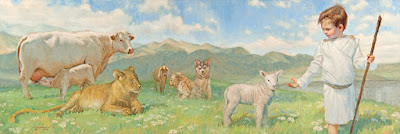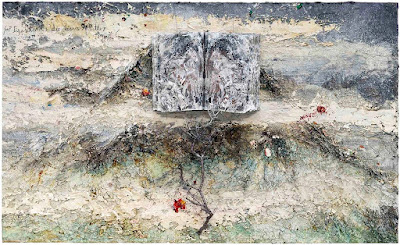One thing that I have always liked with Merton is that he was rarely didactic. He seemed to have learnt a rich lesson:-
I have tried to learn in my writing a monastic lesson I could probably have not learned otherwise: to let go of my idea of myself, to take myself with more than one grain of salt................In religious terms, this is simply a matter of accepting life, and everything in life as a gift, and clinging to none of it, as far as you are able. You give some of it to others, if you can. Yet one should be able to share things with others without bothering too much about how they like it, either, or how they accept it. Assume they will accept it, if they need it. And if they don't need it, why should they accept it? That is their business. Let me accept what is mine and give them all their share, and go my way.
Echoes of the line I have quoted before, from "The Night They Drove Old Dixie Down".........Just take what you need and leave the rest.
Thomas Merton wrote many books but I've tended to favour his Journals and Letters. They tend to get under the radar of the Monastic censors. Merton wrote to many, of all faiths and persuasions. One was D.T.Suzuki and this is from a letter written in 1959, speaking of how Christianity should perhaps have approached those of other Faiths:-
If only we had thought of coming to you and loving you for what you are in yourselves, instead of trying to make you over into our own image and likeness. For to me it is clearly evident that you and I have in common and share most intimately precisely that which, in the eyes of conventional Westerners, would seem to separate us. The fact that you are a Zen Buddhist and I am a Christian monk, far from separating us, makes us most like one another. How many centuries is it going to take for people to discover this fact? …
Relevant to this are a few words Merton wrote when praising Suzuki, this from the book "Zen and the Birds of Appetite":-
Speaking for myself, I can venture to say that in Dr. Suzuki, Buddhism finally became for me completely comprehensible, whereas before it had been a very mysterious and confusing jumble of words, images, doctrines, legends, rituals, buildings, and so forth. It seemed to me that the great and baffling cultural luxuriance which has clothed the various forms of Buddhism in different parts of Asia is the beautiful garment thrown over something quite simple.
And further on:-
I did feel that I was speaking to someone who, in a tradition completely different from my own, had matured, had become complete and found his way. One cannot understand Buddhism until one meets it in this existential manner, in a person in whom it is alive. Then there is no longer a problem of understanding doctrines which cannot help being a bit exotic for a Westerner, but only a question of appreciating a value which is self-evident.
I find a phrase there beautiful and profound........" a value which is self-evident"
Anyway, maybe enough for now. Just to finish, an episode in New York when Merton had tunnelled his way out of his monastery and met up with Suzuki in the flesh. As Suzuki left Merton read out a few words of a South American theologian, "Praise be to God that I am not good". Suzuki was quite taken by this and said:- "That is so important".
Shades of Bodhidharma when telling the Emperor of China that he had earned no merit at all from his good deeds. All genuine ethics are selfless, by-products of "wisdom". Or something like that.
A poem comes to mind, "Heaven Haven" by Gerald Manley Hopkins:-
I have desired to go
Where springs not fail,
To fields where flies no sharp and sided hail,
And a few lilies blow.
And I have asked to be
Where no storms come,
Where the green swell is in the havens dumb,
And out of the swing of the sea.
Perhaps not the best of desires at times, but nevertheless.....

Anyway, back to Merton if I might be so bold and nobody is offended. One of his books is a series of essays on zen, "Zen and the Birds of Appetite". After the essays comes a second section, a dialogue between himself and D.T.Suzuki, "Wisdom in Emptiness". A goldmine of insight and mutual understanding; at least I find it so. On one point, however, these two worthies deviate, this on the subject of "eschatology", or the "last things". Suzuki speaks of "an eschatology of the present moment" in which we become once again "the Tom's, Dick's or Harry's we have always been." Thomas Merton seems not satisfied with such and speaks of further things beyond our ken, some form of new creation. You never know in Merton's published books whether or not he says things purely for the sake of the censor. Who knows. But I am with Suzuki. Coming back to the present moment, yet perhaps with the caveat as found in a book on the zen master Dogen:-
"To teach students the power of the present moment as the only moment is a skillful teaching of buddha ancestors. But this doesn’t mean that there is no future result from practice."
(Dogen's teacher in China to Dogen)
I find in "Zen and the Birds of Appetite" some of Merton's finest writings, matched only by his essay "A Study of Chuang Tzu" which serves as the introduction to his set of (rather loose!) translations of Chuang Tzu, which I have mentioned before somewhere. This essay I have read several times and for me expresses wisdom that transcends all differences between the various Faith traditions, philosophies and religions.
Which reminds me of another book I have mentioned before, "Tariki: Embracing Despair,Discovering Peace" by Hiroyuki Itsuki. Mr Itsuki had known very hard times, as I mentioned, and therefore his own trust/faith was not born of good fortune or superficiality. He writes:-
The Other Power (Tariki) derives from the true and full acceptance of the reality that is within us and surrounds us. It is not a philosophy of passivity or iresponsibility, but one of radical spiritual activity, of personal, existential revolution. Its essence is the spontaneous wondrous force that gives us the will to act, to "do what man can do and then wait for heaven's will." Importantly, Other Power is a power that flows from the fundamental realization that, in the lives we live, we are already enlightened. This enlightenment does not come easily. It is born of the unwelcome understanding that, despite our protestations, we are insignificant, imperfect beings, born to a hell of suffering that defines human existence. But in this hell, we sometimes excounter small joys, friendship, the kind acts of strangers, and the miracle of love. We experience moments when we are filled with courage, when the world sparkles with hopes and dreams. There are even times when we are deeply grateful to have been born. These moments are paradise. But paradise is not another realm; it is here, in the very midst of the hell of this world. Other Power, a power that transcends theological distinctions, avails us of these moments. In the endless uncertainties of contemporary life, Other Power confers upon us a flexibility of spirit, an energy to feel joy, and the respite of peace.
"Transcending distinctions". Yes. Though we all walk our own path.
Merton wrote to all sorts and his letters have been published in 5 volumes.
In the introduction to Volume 1, "The Hidden Ground of Love" you find:-
(Merton) wrote about Allah, Anglicanism, Asia, the Bible, the Blessed Virgin, Buddhism, China, Christ, Christendom, Church, conscience, contemplation, and the cold war; about Eckhart, ecumenism, God, happiness, his hermitage, and his hospital interludes; about illusions, Islam, John of the Cross, Julian of Norwich, Martin Luther King, Jr., the Koran, Latin America, liturgy, the love of God, poetry, political tyranny, precursors of Christ, prophets, psalms, silence, solitude, and sobornost; about technology, Trinity, unity, the will of God, his own writings.

In one episode in the volume devoted to his "personal friends" he had written to the young daughter of one of his older correspondants. In reply the little girl sent him a picture of a house. Merton wrote back, thanking her, and saying how nice the house looked, but that unfortunately it had no path to the door. Very soon he received a new picture from the little girl, the same house but with a path up to the door. Merton then wrote back about "the road to joy that is mysteriously revealed to us without our exactly realising it."
Maybe such exchanges have connections with my own Pure Land leanings, of hakarai, "no calculation" where "things are made to become so of themselves."
Anyway, moving on, an excerpt from another letter. I have posted this before on an Interfaith Forum and one responder spoke of "a beautiful paradox".
This letter of Merton's was written to E.D.Andrews, an expert on the life and beliefs of the Shakers (or the United Society of Believers in Christ's Second Appearing). Andrews had sent Merton a copy of his book, Shaker Furniture, and Merton was responding to the gift. (Sadly, though written in 1961, the words "in our day" remain appropriate)
This wordless simplicity, in which the works of quiet and holy people speak humbly for themselves. How important that is in our day, when we are flooded with a tidal wave of meaningless words: and worse still when in the void of those words the sinister power of hatred and destruction is at work. The Shakers remain as witnesses to the fact that only humility keeps man in communion with truth, and first of all with his own inner truth. This one must know without knowing it, as they did. For as soon as a man becomes aware of "his truth" he lets go of it and embraces an illusion.
I find that "paradox" is at the heart of many things, if not everything.
Getting back to "joy", and the road to it, and relating it to dukkha, very early in my immersion in the Dharma I was questioning what "the end of suffering" would/could actually be. Once I posted a section from a book by a renegade Buddhist (!) who spoke of not wishing to stay involved with pursuing a "pseudo evolved transcendence of personal pain". Leaving that aside, in some ways I have found that having certain/fixed ideas of what "the end of suffering" would be can be counter-productive.
Another quote of Father Louis:- We stumble and fall constantly even when we are most enlightened. But when we are in true spiritual darkness, we do not even know that we have fallen
I thought then of the zen koan, "A clearly enlightened person falls into the well. How is this so?"
Maybe enlightenment is not all its cracked up to be! Much like the guy in the lotus position who is heard to say:- "I'd read so much about it beforehand that now I'm actually enlightened I'm just a little bit disappointed."
Anyway, I do think that plotting a forward path of study with various anticipations of "greater insight" can be the polar opposite of "being a lamp unto ourselves".
One thing said of Thomas Merton, and I have noticed this also, is that often he would exclaim that he had "found what (he) was looking for". It seems that he was often "finding" and yet, apparently it was never quite "it" and the journey continued.
One incident when he "found what he was looking for" was on his Asian Pilgrimage. Merton was in an area in Sri Lanka known as Polonnaruwa which contains many statues of the Buddha and his disciples. This is what is to be found in his Journal:-
The vicar general, shying away from "paganism," hangs back and sits under a tree reading the guidebook. I am able to approach the Buddhas barefoot and undisturbed, my feet in wet grass, wet sand. Then the silence of the extraordinary faces. The great smiles. Huge and yet subtle. Filled with every possibility, questioning nothing, knowing everything, rejecting nothing, the peace not of emotional resignation but of Madhyamika, of sunyata, that has seen through every question without trying to discredit anyone or anything - without refutation - without establishing some other argument. For the doctrinaire, the mind that needs well-established positions, such peace, such silence, can be frightening. I was knocked over with a rush of relief and thankfulness at the obvious clarity of the figures.................looking (at them) I was suddenly, almost forcibly, jerked clean out of the habitual, half-tied vision of things, and an inner clearness, clarity, as if exploding from the rocks themselves, became evident and obvious. The queer evidence of the reclining figure, the smile, the sad smile of Ananda standing with arms folded.....The thing about all this is that there is no puzzle, no problem, and really no "mystery". All problems are resolved and everything is clear, simply because what matters is clear. The rock, all matter, all life, is charged with dharmakaya.....everything is emptiness and everything is compassion.
I remember way back posting some of this on another Forum and an ardent Christian said to me: " You do realise that he was looking at rocks" , obviously implying idolatry. I think I spoke about William Blake, of seeing through the eye, not with the eye, but the distinction was lost on him.
Well, as said, that was one of Merton's eureka moments. Some advise not to become attached to such, let them go, do not identify. I think good advice.
Further on for Merton, on his last pilgrimage, meeting with many Buddhists, he gave a talk just hours before his untimely death. He spoke of "true communication".....
True communication on the deepest level is more than a simple sharing of ideas, conceptual knowledge, or formulated truth...............And the deepest level of communication is not communication, but communion. It is wordless, it is beyond words, and it is beyond speech, and it is beyond concept. Not that we discover a new unity. We discover an older unity. My dear brothers and sisters, we are already one. But we imagine that we are not. And what we have to recover is our original unity. What we have to be is what we are.
(I have added "and sisters" to spare Merton's blushes)
Yes, true communication. There is a book by a Pure Land Buddhist, "Tariki: Embracing Despair,Discovering Peace" by Hiroyuki Itsuki. In it he speaks of the actual transmission of "truths/dharma" as being, ideally, face to face. I keep forgetting the Japanese word for it, it might be menji but I am not sure. Hiroyuki Itsuki had a disturbing childhood, a few years as a refugee. He spoke of times, waking up, finding the one next to you had died in the night, and feeling glad.......you could take his clothes and other possessions. Itsuki spoke of his father, a man who was constantly seeking to better himself, never satisfied. Itsuki spoke of when his father came home in the evening, sat down with a deep sigh on the bed and took off his boots. "I learnt more from my father's sigh than from all the books of philosophy I have read". "Menji" or, communion. Learning together. Beyond any separate "self".

Another thing from Merton's words is the "what we have to be is what we are". This has echoes for me of the Mahayana teaching of Original Enlightenment, that everything of true value is a realisation and not truly an attainment. It is a gift. Given. Not earned in spite of the effort we often put into practice.
Dogen was troubled by the Mahayana doctrine, and wondered what was the point of practice, why the masters of old poured over the sutras and practiced so assiduously. He had to find his own answer, as maybe we all need to do. Dogen eventually found his own path, time and place. We must find ours. They are, paradoxically, the same yet different.
In some Pure Land imagery the individual is seen as the lotus flower, while the undifferentiated nature of enlightenment is of gold. The Pure Land is one of infinite golden lotus flowers. So, communion. And it can be "now". Much religion is - as I see it - a betrayal of this world for some imagined "other". It need not be so.
By the way, Thich Nhat Hanh was actually a visitor to Merton's hermitage, built in the woods around his monastery. Merton met all sorts there. Joan Baez once (with whom he planned some sort of midnight escapade when engaged in his dalliance with a young female nurse - but that is more one for the tabloid press rather than a blog such as this.....



















































